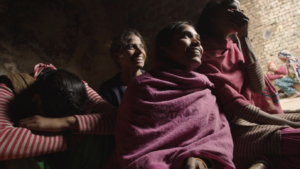
Women gathered together in India to see the documentary, Period. End of Sentence. photo: Sam Davis
The 26-minute film is now streaming.
By Samantha Leach, Glamour, February 25, 2019
w.glamour.com/story/period-end-of-sentence-netflix
The Academy Awards haven’t always favored female directors.
In the 91-year history of the show, only five have ever been nominated for Best Director, and this year, once again, the category is made up of solely men. It’s not entirely dire, though, if you turn your attention to other categories.
Take, for example, Period. End of Sentence, which won Best Documentary Short Subject and was directed by a woman: Rayka Zehtabchi, a 25-year-old Iranian-American director.
Period. End of Sentence., a which tackles the stigma around menstruation in rural India, is currently available for streaming on Netflix.
The 26-minute documentary follows a group of women who use a new machine to create low-cost sanitary pads to create financial independence while also improving feminine hygiene in their village.
Now, according to Time, their pads are being used in 40 nearby villages.
The film also gives viewers a peek into how taboo menstruation is in these communities, where 23 percent of girls drop out school when they hit puberty due to their periods.
For Zehtabchi, seeing just how ingrained period stigma was for the women was the most life-changing part of making the film.
Zehtabchi tells Glamour, “Some of the craziest moments during filming would be when we talked to older women—who had gone their entire lives menstruating and should have been talking to their daughters about menstruation—but couldn’t even tell us why it happened every month, or why they got it.
“It breaks your heart because if they’re so afraid of the thing that makes them women, then I can’t imagine what else you would be afraid to do or talk about.”
Zehtabchi was approached to direct the documentary by the Pad Project, the incredible organization that first brought this story to light.
In 2012, Los Angeles–based teacher Melissa Burton brought students and staffers together to travel to Kathikhera, India to set up the pad-making machine that is featured in the film.
But after their trip, they wanted to do more than just install a machine: They wanted to start a conversation about period stigma around the world. And thus the documentary was born.
Even though the film has now received such incredible recognition, Zehtabchi and the Pad Project’s mission has stayed the same: to spread as much awareness about this issue as possible.
“After they see the film, I hope people understand this period stigma doesn’t just affect those in India. We experience it in the United States and in other cultures as well,” Zehtabchi says.
“I also want viewers to realize that empowering women worldwide really starts with beginning, with opening up the conversation around menstruation.
“We can implement feminine hygiene, but first we have to break the taboo. I also want people to realize this isn’t just a film for women, it’s for men too. They’re 50 percent of the population, and men need to be having these conversations and championing the film just as much as women are.”
As for being one of a few female directors nominated by the academy, Zehtabchi says, “Why does it have to be so amazing? Why does this have to be shocking that I’m a female director and that I’ve made a film about a women’s issue, in a country we don’t think much about, and that the film is getting attention?”
We couldn’t agree more.
Samantha Leach is an assistant culture editor at Glamour. Follow her on Twitter @_sleach.

